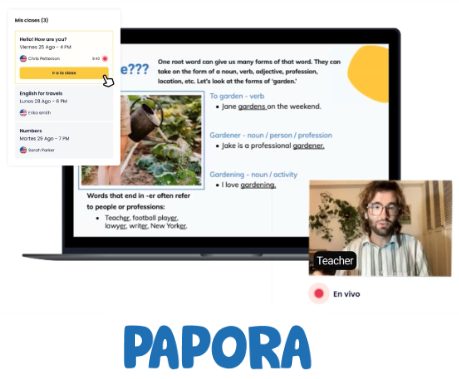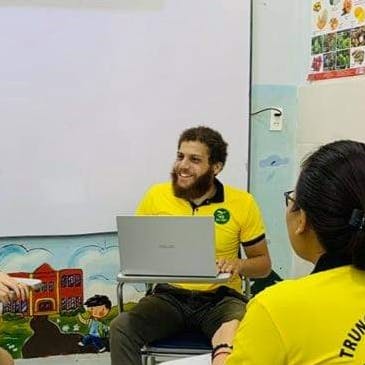Learning English in seven days may sound like science fiction, yet there’s a book with that very title — and more than a few people claim it’s possible.
But how much of that is true? Can you really master a language in just a week? What’s fact and what’s fiction when it comes to learning English in 7 days?
It’s clear that meaningful learning takes time. As with any other skill, there are no miracles when it comes to mastering English. However, there are effective methods and strategies that can significantly speed up the learning process and help you make real progress.
Ramón Campayo's Technique for Learning English Fast
Ramón Campayo is like a speed-reading runner. He holds world records for reading and memorization speed, and that's why he claims it's possible to learn English in 7 days.
His technique for learning English is based on using mnemonics, that is, tricks to memorize words more easily and quickly, such as associating a concept with a person, a color, or any image or sound.
For example, imagine you're learning English vocabulary and want to memorize the word "happy." You probably already know what it means, but it serves as an example.

You could use an association trick and think of something that makes you happy, or a very cheerful person you know, so that every time you want to remember what that word means in English.
Another example might be if you want to remember the word "cookies," you could associate it with your favorite brand of cookies.
This way, you'll go back to another memory you already have, and you're more likely to remember the new word; you'll be able to memorize it.
Learn English easily and quickly!
Learning English with Papora is so easy that you'll feel like time flies by.
Get started now!

Reviews of "Learn English in 7 Days"
The author's proposal in this book is quite daring; to say that you can learn English in 7 days is impressive.
And since there is no absolute truth in learning techniques, the most valuable opinions will always come from a reader, especially if they took the time to post a review on their website.
“In this essentially practical book, Ramón Campayo develops the method proposed in his two previous books (Develop a Prodigious Mind and Learn a Language in 7 Days) by designing tables for learning around 600 words through unlikely associations. The title should be more like "Learn 600 Words in a Week." The tables aren't exactly imaginative, either, but hey, if they're useful for anyone learning English, they're welcome.”
What Ramón Campayo proposes can be very useful if you need to expand your English vocabulary in 7 days.
The book also shares the author's memorization techniques, which is valuable for such short periods of time.
“Campayo's methodology for learning English very quickly isn't just about memorization; it skips the entire grammar section. The only thing he leaves behind in this section of his language slaughter is a highly personal version that only addresses the present and future tenses with "will."”
Pros and Cons
Without a doubt, this book and its technique have generated many sales thanks to its great inventiveness and its proposed format and product.
But like everything, when approaching a method for learning English so quickly, it's important to consider its positive and negative aspects.
Positive
Something worth highlighting in Campayo's study, and one that is undoubtedly useful for learning the language and anything else, is the power of memorization by association.
This is particularly noteworthy, especially because he bases his technique on words, which is amazing if you want to include new vocabulary.
Furthermore, his emphasis on repetition is notable within his system, and how useful it is for remembering a word or different pieces of information.
Negative
However, the author's technique lacks a foundation for learning pronunciation and grammar, and although it touches on these in the book, it also lacks a lot about verb tenses.
Everyone needs these crucial points for learning English, whether they are looking to learn the language at a basic level or not.

So, everything you learn in Campayo's book can be useful if you want to break records in learning to speak English.
But memorization and association techniques can't be your only resource.
Tim Ferris's Rapid Language Learning Technique
Tim Ferriss, author of the famous bestseller "The 4-Hour Workweek," also argues that it's possible to learn languages in a very short time.
This young entrepreneur explains his own experience learning languages very quickly, or even how he managed to learn to swim in just a few days.
Tim Ferriss's proposal is based on the Pareto Principle, which states that 20% of the words in a language are used 80% of the time.

The idea is that when we speak a language, we typically use a limited range of words.
We can maintain most everyday conversations with a small number of terms, so we could easily converse in English by learning a few hundred words, without needing to master the other thousands of terms the language has.
Reviews of the book "The 4-Hour Workweek"
While the author's book and method aren't primarily focused on learning a new language, most of his titles and suggestions may serve that purpose.
But, as we've said throughout this post, the most important thing will always be the readers, those who have tried his system.
“The author's complete proposal is impractical for 99.9% of people, yet he dares to challenge stale ideas about life and work, which can help us improve things to a small extent.”
Deciding which method to use to study English in 7 days isn't like ordering something from Amazon and then returning it if you don't like it.
The best thing to do is always to introspect about yourself, your way of learning, and your way of life, and choose the system that best suits your needs.
These opinions show both perspectives.
“I definitely recommend reading The 4-Hour Workweek, because in addition to reminding us that today we have all the tools we need to transform our lives at our fingertips, we can fully enjoy work and contribute to building something better, all while having fun and growing.”
Pros and Cons
When it comes to the Ferris system, opinions are quite divided — and often very passionate — about how it should be applied, since it’s closely tied to each person’s lifestyle and their level of flexibility or willingness to adapt.
Positive
This author's book and technique offer a very interesting perspective on how long it takes to learn English and how you can manage it to your advantage. Which is wonderful if you only have 7 days.
Additionally, the 80/20 approach is really valuable so you don't spend your time scrolling through words you probably won't use.
That is, if you want to learn English because you have to go on a business trip with your company, analyze your situation, the state of your English level, and focus on learning only the words you'll need.

Or, on the contrary, if you're traveling for fun, focus your lessons on the services you'll need, such as restaurants, transportation, and plans.
Negative
Time management techniques don't work for everyone, as they largely depend on each person's lifestyle, responsibilities, and daily routine.
Also, keep in mind that what Ferris suggests in his books isn't specifically for learning new languages.
They can be very useful in different areas of your life, but they won't teach you how to learn English.
How to learn English in 7 days by combining both techniques
You can learn English from home in 7 days by combining Tim Ferris's method and Ramón Campayo's method with these suggested steps:
- Choose the thousand most common English words, especially the ones you'll use the most.
- Prepare a notebook or Excel document with those thousand words.
- Manage your time profitably with Tim Ferris's tips.
- Use Campayo's speed reading tips to absorb many English vocabulary words every day.
- Use mnemonic tricks, as well as different formats that help you reinforce your learning, such as audio recordings, tests, or even asking someone to quiz you.
- Reinforce your learning with grammar, pronunciation, listening, and much more.
- It's best to start a dynamic and easy course that gives you the freedom to learn a lot and a little bit of everything in a single day, like Papora.

What's the problem with the thousand-word method for learning English?
According to the Oxford English Dictionary, the English language contains around 700,000 words, although many of them originate from Old English.
However, that impressive number doesn’t mean you need to learn them all — in fact, only about 20% of those words are commonly used, and mastering just the most frequent 1,000 is often enough to build a strong foundation.
Every language comes with its own layers of complexity, from accents and pronunciation to idiomatic expressions and cultural references.
If your goal is to truly master English, a one-week sprint won't cut it. The best ways to speak English fast still require consistent effort, dedication, and plenty of practice to achieve real fluency.
Tips from Expert Teachers
Since there are no magic tricks for learning English in 7 days, we've gathered tips from teachers that you can include in your learning plan and that will surely be very useful in such a short time.
Learning the Sounds
In English, it's not just important to learn grammar and vocabulary. Listening is at the most crucial point.
Knowing how to differentiate the sounds of words will allow us to listen and understand someone speaking the language correctly, and it also helps us with pronunciation.
“If we don't have a specific sound in the language, it can be difficult to hear how it differs from other sounds. If you listen to spoken English frequently, you'll begin to hear these differences.”
How can you learn sounds? The best way is to listen to audio clips from native speakers, whether it's YouTube videos, TV commercials, or anything else.
This is why at Papora we strive to use audio clips from real people, which help improve listening, comprehension, and imitation of sounds.
Immersion Technique
There's nothing better for learning something than immersing yourself in it, and English is no exception. When you have a 7-day window to learn a new language, it's best to use this format.
“I recommend immersing yourself in the language as much as possible, which can mean different things depending on whether you're in an English-speaking country or not. Learning the basics of grammar is the foundation of any language and is essential.”
If you want to use this method at home, it's best to transform everything you do into English.
For example, only watch TV in English, work while thinking in English, and if you're going to make a recipe, look it up in English. It's about changing everything.
Learn vocabulary
As you may have noticed, vocabulary is one of the most important things when speaking, in English and in any other language.
“Without a good vocabulary, language learning can be slow and tedious. Having to translate every word you read or hear will slow your progress and demotivate you in the long run.”
It won't do you any good to constantly translate what you hear or read with a dictionary or Google. It's better to know how to learn English vocabulary and the context in which it can be used.
Never stop practicing
They say that practice makes perfect. Whether you've already completed the 7 days or not, don't forget to keep learning.
“Practice is an essential part of learning a language. With a rational approach, studying words every day, your results will undoubtedly improve in the near future.”
You can learn English in 7 days, but only a basic understanding.
Of course, a good method is key to learning English quickly, and sometimes we put off our decision to improve our English for too long, but that doesn't mean that all in-depth learning is a long-distance race.
Regarding Campayo's method, we can read quickly and memorize well, but language is also based on understanding (listening), conjugating (verbs), and constructing sentences well (grammar).
What should you keep in mind before deciding to learn English in a few days?
The problem with these so-called “magic” methods for learning English is that they often lead to bad habits — much like learning to drive without proper instruction.
It’s essential to master the basics from the start: conjugating verbs correctly, using those tricky phrasal verbs properly, and pronouncing words accurately. For instance, knowing how to conjugate to write correctly is crucial if you want to avoid common mistakes.

This approach will help you communicate more clearly. In both professional and social settings, your level of English can make a significant difference in your success. The ability to express yourself clearly, write with proper spelling, and pronounce words correctly ensures that your message is truly understood.
It’s possible to learn basic English in a few days with the right techniques. If your goal is to master the language, including verb conjugation and more advanced skills, consistent practice over months or years is essential. A daily home routine for studying English helps you build skills step by step, so your progress sticks.
If you aim to reach an advanced level of English that allows you to handle any situation almost like a native speaker, remember that it won’t happen overnight. Still, the time, effort, and dedication you invest in learning will absolutely pay off.
Ready to improve your English with our fast and effective method? Start for free today.
Frequently asked questions about learning English in 7 days
The key will depend on your needs. The first step is to determine what you'll be using the language for and what you really need to learn. Then you can use mnemonics, the immersion method, and everything else. Papora is an excellent website for achieving this, as it brings together dynamic ways to learn quickly and easily.
When learning, time is relative, but if you're looking for a basic level of English, in a couple of weeks or months you could be able to communicate, speak, and read, with a few stumbling blocks. However, learning a new language never ends; it will be a daily learning process forever.








